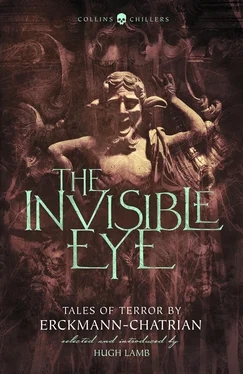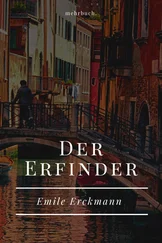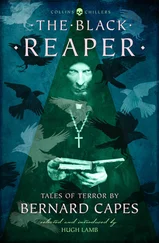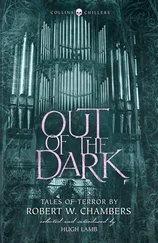The aim of Hippel’s journey was the same as mine; in his quality of first-rate connoisseur he wanted to confirm his opinion as to the peculiarities of certain growths about which he still entertained some doubts.
So we continued our route together. Hippel was extremely gay; he traced out our route among the Rhingau vineyards. We halted occasionally to devote our attention to our flasks, and to listen to the silence which reigned around us.
The night was far advanced when we reached a little inn perched on the side of a hill. We dismounted. Hippel peeped through a small window nearly level with the ground. A lamp was burning on a table, and by it sat an old woman fast asleep.
‘Hallo!’ cried my comrade; ‘open the door, mother.’
The old woman started, got up and came to the window, and pressed her shrunken face against the panes. You would have taken it for one of those old Flemish portraits in which ochre and bistre predominate.
As soon as the old sybil could distinguish us she made a grimace intended for a smile, and opened the door for us.
‘Come in, gentlemen – come in,’ cried she with a tremulous voice; ‘I will go and wake my son; sit down – sit down.’
‘A feed of corn for our horses and a good supper for ourselves,’ cried Hippel.
‘Directly, directly,’ said the old woman assiduously.
She hobbled out of the room, and we could hear her creeping up stairs as steep as a Jacob’s ladder.
We remained for a few minutes in a low smoky room. Hippel hurried to the kitchen, and returned to tell me that he had ascertained there were certain sides of bacon by the chimney.
‘We shall have some supper,’ said he, patting his stomach; ‘yes, we shall get some supper.’
The flooring creaked over our heads, and almost immediately a powerful fellow with nothing but his trousers on, his chest bare, and his hair in disorder, opened the door, took a step or two forward, and then disappeared without saying a word to us.
The old woman lighted the fire, and the butter began to frizzle in the frying-pan.
Supper was brought in; a ham put on the table flanked by two bottles, one of red wine, the other of white.
‘Which do you prefer?’ asked the hostess.
‘We must try them both first,’ replied Hippel, holding his glass to the old woman, who filled it with red.
She then filled mine. We tasted it; it was a strong rough wine. I cannot describe the peculiar flavour it possessed – a mixture of vervain and cypress leaves! I drank a few drops, and my soul became profoundly sad. But Hippel, on the contrary, smacked his lips with an air of satisfaction.
‘Good! very good! Where do you get it from, mother?’ said he.
‘From the hillside close by,’ replied the old woman, with a curious smile.
‘A very good hillside,’ returned Hippel, pouring himself out another glass.
It seemed to me like drinking blood.
‘What are you making such faces for, Ludwig?’ said he. ‘Is there anything the matter with you?’
‘No,’ I answered, ‘but I don’t like such red wine as this.’
‘There is no accounting for tastes,’ observed Hippel, finishing the bottle and knocking on the table.
‘Another bottle of the same,’ cried he, ‘and mind, no mixing, lovely hostess – I am a judge! Morbleu ! this wine puts life into me, it is so generous.’
Hippel threw himself back in his chair; his face seemed to undergo a complete transformation. I emptied the bottle of white wine at a draught, and then my heart felt gay again. My friend’s preference for red wine seemed to me ridiculous but excusable.
We continued drinking, I white and he red wine, till one o’clock in the morning.
One in the morning! It is the hour when Fancy best loves to exercise her influence. The caprices of imagination take that opportunity of displaying their transparent dresses embroidered in crystal and blue, like the wings of the beetle and the dragon-fly.
One o’clock! That is the moment when the music of the spheres tickles the sleeper’s ears, and breathes the harmony of the invisible world into his soul. Then the mouse trots about, and the owl flaps her wings, and passes noiselessly over our heads.
‘One o’clock,’ said I to my companion; ‘we must go to bed if we are to set off early tomorrow morning.’
Hippel rose and staggered about.
The old woman showed us into a double-bedded room, and wished us goodnight.
We undressed ourselves; I remained up the last to put the candle out. I was hardly in bed before Hippel was fast asleep; his respiration was like the blowing of a storm. I could not close my eyes, as thousands of strange faces hovered round me. The gnomes, imps, and witches of Walpurgis night executed their cabalistic dances on the ceiling all night. Strange effect of white wine!
I got up, lighted my lamp, and, impelled by curiosity, I went up to Hippel’s bed. His face was red, his mouth half-open, I could see the blood pulsating in his temples, and his lips moved as if he wanted to speak. I stood for some time motionless by his side; I tried to see into the depths of his soul, but sleep is an impenetrable mystery; like death, it keeps its secrets.
Sometimes Hippel’s face wore an expression of terror, then of sadness, then again of melancholy; occasionally his features contracted; he looked as if he was going to cry.
His jolly face, which was made for laughter, wore a strange expression when under the influence of pain.
What might be passing in those depths? I saw a wave now and then mount to the surface, but whence came those frequent shocks? All at once the sleeper rose, his eyelids opened, and I could see nothing but the whites of his eyes; every muscle in his face was trembling, his mouth seemed to try to utter a scream. Then he fell back, and I heard a sob.
‘Hippel! Hippel!’ cried I, and I emptied a jug of water on his head.
This awoke him.
‘Ah!’ cried he, ‘God be thanked, it was but a dream. My dear Ludwig, I thank you for awakening me.’
‘So much the better, and now tell me what you were dreaming about.’
‘Yes, tomorrow; let me sleep now. I am so sleepy.’
‘Hippel, you are ungrateful; you will have forgotten it all by tomorrow.’
‘ Morbleu ,’ replied he, ‘I am so sleepy, I must go to sleep; leave me now.’
I would not let him off.
‘Hippel, you will have the same dream over again, and this time I shall leave you to your fate.’
These words had the desired effect.
‘The same dream over again!’ cried he, jumping out of bed. ‘Give me my clothes! Saddle my horse! I am off! This is a cursed place. You are right, Ludwig, this is the devil’s own dwelling-place. Let us be off!’
He hurried on his clothes. When he was dressed I stopped him.
‘Hippel,’ said I, ‘why should we hurry away? It is only three o’clock. Let us stay quietly here.’
I opened the window, and the fresh night air penetrated the room, and dissipated all his fears. So he leaned on the window-sill, and told me what follows.
‘We were talking yesterday about the most famous of the Rhingau vineyards. Although I have never been through this part of the country, my mind was no doubt full of impressions regarding it, and the heavy wine we drank gave a sombre tinge to my ideas. What is most extraordinary, in my dream I fancied I was the burgomaster of Welcke’ (a neighbouring village), ‘and I was so identified with this personage, that I can describe him to you as minutely as if I was describing myself. This burgomaster was a man of middle height, and almost as fat as I am. He wore a coat with wide skirts and brass buttons; all down his legs he had another row of small nail-headed buttons. On his bald head was a three-cornered cocked hat – in short, he was a stupidly grave man, drinking nothing but water, thinking of nothing but money, and his only endeavour was to increase his property.
Читать дальше












